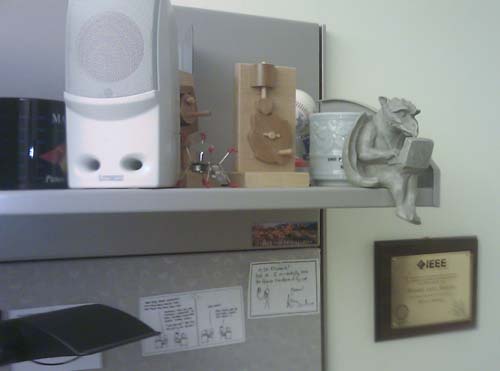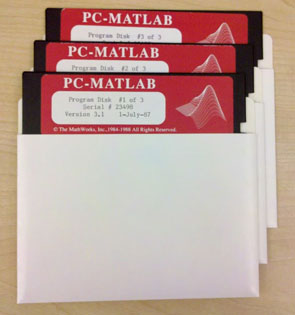References on my shelf
Matt Whitaker asked me in a blog comment recently about the references I keep on my own shelf.
Well, first of all I seem to keep fewer things on my bookshelves as the years go by. When I first started at MathWorks I had two tall bookcases in my office, filled with about 25 linear feet of books and journals. I guess I still had the academic's pack-rat habit. Now I'm down to about 5 feet of books in my office, plus about another 5 feet of journals on the team bookcase nearby.
I don't actually keep any image processing books in my office (except for my own, of course). When we're studying algorithms for possible use in our products, mostly we are looking at journal papers, and most of those are available online. The 5 feet of journal space on the team bookcase is for IEEE Transactions on Pattern Analysis and Machine Intelligence, which for some mysterious reason is still not available in electronic form. [Update: it's available now.] The image processing book that's been the most useful for toolbox development is Soille's Morphological Image Analysis: Principles and Applications. We learned a lot from that book when we were working on morphology functions in Image Processing Toolbox version 3, and I still refer to it regularly.
For the occasional digital signal processing theory question, I have two books from my grad school days: Oppenheim and Schafer's Discrete-Time Signal Processing (signed by Schafer!) and Dudgeon and Mersereau's Multidimensional Digital Signal Processing.
Most of my bookshelves these days are taken up with software development books:
- General software development books like Code Complete by McConnell, The Pragmatic Programmer by Hunt and Thomas, and Refactoring by Fowler
- Algorithms in C (in multiple volumes) by Sedgewick
- Design Patterns by the "gang of four"
- A pile of C++ books by authors such as Josuttis, Alexandrescu, Meyers, Sutter, and Vandevoorde
But perhaps the most important thing on my shelf is my personal gargoyle, who has been watching over me protectively for many years.

What's your favorite thing (book or otherwise) on your bookshelves? Post a comment.









댓글
댓글을 남기려면 링크 를 클릭하여 MathWorks 계정에 로그인하거나 계정을 새로 만드십시오.